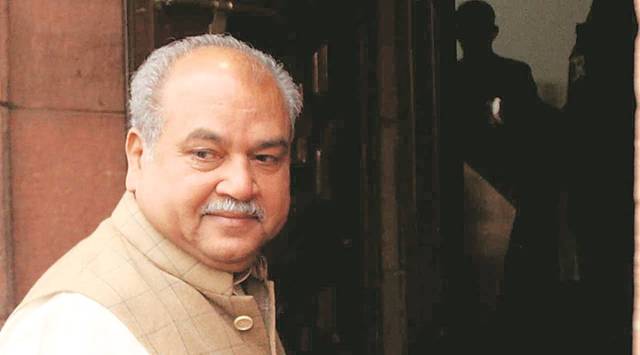Tomar also hit out at Opposition parties and asked why they did not include MSP as part of law when they were in power “for many years”.

Responding to a question during an online Idea Exchange event of The Indian Express, he said: “Through you, I want to tell the people of the Opposition that all of you have been in government for many years, if the law was necessary for the MSP, then why did you not make it?… MSP kanoon ka ang pehle bhi nahin thi aur MSP kanoon ka ang aaj bhi nahin hai (MSP was not a part of the law even earlier and MSP is not part of the law even today).”
Suggesting that the government will not concede to Opposition demands on MSP, the Union Minister said: “MSP is an administrative decision of the Government of India and procurement has been taking place as a result of MSP. The Modi government had started declaring MSP by adding 50 per cent profit to the cost.”
Despite protests from farmers in Punjab and Haryana, the government passed three Farm Bills during the Monsoon Session: The Farmers Produce Trade and Commerce (Promotion and Facilitation) Bill, 2020; The Farmers (Empowerment and Protection) Agreement on Price Assurance and Farm Services Bill, 2020; and, The Essential Commodities (Amendment) Bill, 2020.
The key objection raised by protesting farmers is against a provision in the first Bill, which provides for the creation of a “trade area” outside APMC mandis. The farmers have expressed fears that if the mandi system comes to an end, the MSP mechanism would be scrapped, too.
However, with the government raising the MSP for six Rabi crops, including wheat, after the passage of the Bills, Tomar reiterated that MSP-based procurement will continue.
Story continues below this ad
“We have declared Rabi MSP before sowing of crops and the kharif crop is due in a few days, which will be procured on MSP. The Prime Minister has said that the MSP will continue, so why does anyone need to worry? And MSP has nothing to do with these Bills. The Bills deal with trade outside the mandi premises,” he said.
READ | Back farmers’ demand to legalise MSP as floor price, says ally JD(U)
 Farmers protest in Patiala (Express photo by Harmeet Sodhi)
Farmers protest in Patiala (Express photo by Harmeet Sodhi)
The government fixes MSP of 22 “mandated agricultural crops” and the Fair and Remunerative Price (FRP) for sugarcane based on recommendations of the Commission for Agricultural Costs & Prices (CACP).
Defending the Bills, Tomar said the NDA government has taken the decision in the interest of the country. “If any decision is to be taken in the interest of the country, then the Modi government is committed to take that decision regardless of votes. Such decisions have been taken earlier also and will continue to happen in the future. I am sure that agriculture and farmers will get a huge amount of benefit from these Bills,” he said.
Story continues below this ad
Later, speaking separately to The Indian Express, a top government official echoed the Minister’s views. “You cannot fix the price of a commodity with a law. What will happen if there is a sudden increase or decrease in the price of that commodity? Will you change the law each time?” the official asked.
Moreover, experts said, setting MSP as a floor price legally will effectively derail the market for other players. Also, they pointed out that when and whether a government procures which crop depends on a range of factors that vary from season to season and crop to crop — codifying this in law could open the window to a slew of legislation.



 Farmers protest in Patiala (Express photo by Harmeet Sodhi)
Farmers protest in Patiala (Express photo by Harmeet Sodhi)





